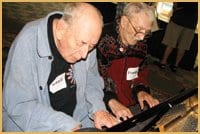Many of Vancouver’s queer elders have been pioneers in the fight to live openly and honestly, despite facing years of hostility, discrimination and just plain ignorance. On Jun 29, The Centre dedicated an afternoon to honouring our community’s trailblazers at its fifth annual Honouring Our Elders high tea, held at the Coast Plaza Hotel.
With over 90 people in attendance, there were plenty of amazing memories to share and struggles to celebrate. Here are a few of their stories.
Basil Hunter and Frank Allison
Hunter and Allison, now both in their 90s, celebrated their 50th anniversary on Valentine’s Day earlier this year.
Both musicians, the couple played together for nine years at the Press Club in the 1960s, entertaining Vancouver’s elite and visiting entertainers.
Hunter wrote “Pacific Rhapsody and Brideship Ballet,” which became part of BC’s centennial celebrations.
They count Phyllis Diller amongst their close friends, and they didn’t let little things like a bum hip or knee keep them away from busting out a duet on the piano to everyone’s delight.
Hunter: “When I saw her [Diller] in the dressing room [at the Cave], she was a mess and she said, ‘What do you think of my hairdo, Basil?’
“And I said, ‘What did you do it with, Phyllis? An electric toothbrush?’
“She said, ‘Can I use that?’ And I said ‘That’s a line you can have.’
“And you can still hear her today using that on TV.”
Gayle Roberts
After wrestling for years with her desire to transition to female, Roberts finally took the plunge in her early 50s, risking a lengthy career as a high school teacher and her personal relationships. Now she’s finding a new voice as a writer.
Roberts: “This is a celebration that things are getting better all the time. When I made that decision to transition, all that pain I’d been feeling all of my life suddenly just ended, and I’ve never looked back. One student told me she thought I was brave and an inspiration, and I think in that sense you’re a pioneer because by your example you’re making it easier for other people.”
Chris Morrissey and Bridget Coll
Together for over 30 years, thorny immigration issues became the thrust of an ultimately successful federal legal challenge as Morrissey (Canadian) fought to have Coll (Irish with US citizenship) recognized as her spouse so they could settle together here.
Morrissey is now the program manager of The Centre’s Generations Project, which hosted the high tea.
Morrissey: “There isn’t much visibility with older queers, and it’s really important to acknowledge their lives.
“I’m the first Canadian to file a suit in federal court to be able to sponsor my partner. We came back from Latin America and we decided to settle in Canada. We tried every normal way, so we had to file a suit with federal court. We didn’t have to go to court because immigration stepped in and [granted Coll residency]. But we’ve worked getting the legislation changed to include same-sex partners in family class for immigration.”
Ellen Woodsworth
Woodsworth came out in 1970 and has spent her life advocating for gay and lesbian rights and other equality issues. She also served as Vancouver’s first openly lesbian city councilor from 2002-2005.
She revealed at the high tea that she’ll be seeking a seat on city council again in this fall’s municipal election.
Woodsworth: “I was one of the early people in this country out and working for gay and lesbian rights in the late ’60s, early ’70s. I know the world is way, way better than we ever thought it could be because we organized together, we stood up, and we fought back, but it’s not good enough yet and we have to keep working together.”
Christine Waymark and Robin Rennie
Together since 1981, the couple has fought plenty of uphill battles. Rennie says she brought gay and lesbian rights into the programming at Family Services in the late 1970s. In the 1980s, Waymark says she was a candidate for ministry in the United Church when she was outed by a committee member and dismissed from the remaining finalists.
Rennie: “When I first came out [in 1972] it was a very hard thing to come out. There was nothing to come out to. I felt very alone…
“I applied for the [Family Services] job not knowing that they were actually looking for somebody who was out. It turned out they wanted me to go out into the community and solicit people who would become involved with Family Services programs. I think it went very slowly, but it was wonderful.”
Waymark: “When I was outed, I decided to become active and become honest. I got dropped as a candidate and I went on to be in AFFIRM, the United Church organization of gays and lesbians. I was the only lesbian to write the report that eventually led to the ordination of gays and lesbians in the United Church in ’88.
“It’s really important to me that I have places where I can just be me. And “me” is definitely queer.”

 Why you can trust Xtra
Why you can trust Xtra


